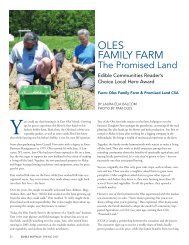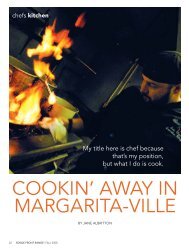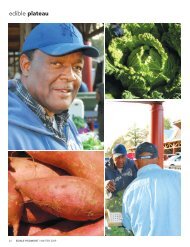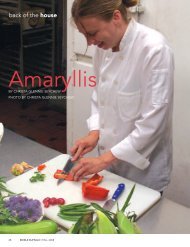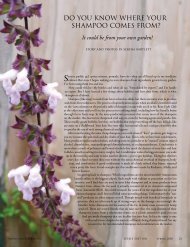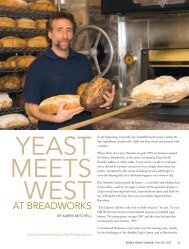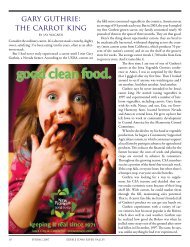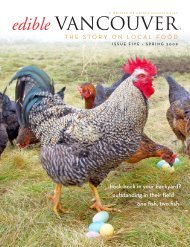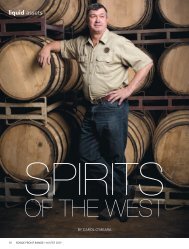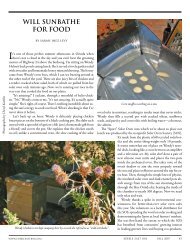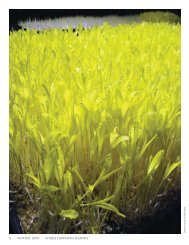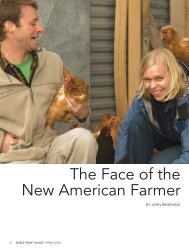The pleasure of eating - Edible Communities
The pleasure of eating - Edible Communities
The pleasure of eating - Edible Communities
Create successful ePaper yourself
Turn your PDF publications into a flip-book with our unique Google optimized e-Paper software.
Photo by Carole Topalian<br />
drugs and chemicals increases. Capital replaces labor by substituting<br />
machines, drugs, and chemicals for human workers and for the natural<br />
health and fertility <strong>of</strong> the soil. <strong>The</strong> food is produced by any means or<br />
any shortcuts that will increase pr<strong>of</strong>its. And the business <strong>of</strong> the<br />
cosmeticians <strong>of</strong> advertising is to persuade the consumer that food so<br />
produced is good, tasty, healthful, and a guarantee <strong>of</strong> marital fidelity<br />
and long life.<br />
It is possible, then, to be liberated from the husbandry and wifery<br />
<strong>of</strong> the old household food economy, but only by entering a trap (unless<br />
one sees ignorance and helplessness as the signs <strong>of</strong> privilege, as many<br />
apparently do). How does one escape this trap? Only voluntarily, the<br />
same way one went in: by restoring one's consciousness <strong>of</strong> what is<br />
involved in <strong>eating</strong>; by reclaiming responsibility for one’s own part in the<br />
food economy. One might begin with the illuminating principle <strong>of</strong> Sir<br />
Albert Howard's <strong>The</strong> Soil and Health, that we should understand ‘the<br />
whole problem <strong>of</strong> health in soil, plant, animal, and man as one great<br />
subject.” Eaters, that is, must understand that <strong>eating</strong> takes place<br />
inescapably in the world, that it is inescapably an agricultural act, and<br />
how we eat determines, to a considerable extent, how the world is used.<br />
This is a simple way <strong>of</strong> describing a relationship that is inexpressibly<br />
complex. To eat responsibly is to understand and enact, so far as we can,<br />
this complex relationship. What can one do? Here is a list, probably<br />
not definitive:<br />
1. Participate in food production to the extent<br />
that you can. If you have a yard or even just a porch box<br />
or a pot in a sunny window, grow something to eat in it. Make<br />
a little compost <strong>of</strong> your kitchen scraps and use it for fertilizer.<br />
Only by growing some food for yourself can you become acquainted<br />
with the beautiful energy cycle that revolves from soil<br />
to seed to flower to fruit to food to <strong>of</strong>fal to decay, and around<br />
again. You will be fully responsible for any food that you grow<br />
for yourself, and you will know all about it. You will appreciate<br />
it fully, having known it all its life.<br />
2. Prepare your own food. This means reviving in your<br />
own mind and life the arts <strong>of</strong> kitchen and household. This<br />
should enable you to eat more cheaply, and will give you a<br />
measure <strong>of</strong> “quality control.”<br />
3. Learn the origins <strong>of</strong> the food you buy, and buy<br />
the food that is produced closest to your home.<br />
<strong>The</strong> idea that every locality should be, as much as possible, the<br />
source <strong>of</strong> its own food makes several kinds <strong>of</strong> sense. <strong>The</strong> locally<br />
produced food supply is the most secure, freshest, and the easiest<br />
for local consumers to know about and to influence.<br />
4. Whenever possible, deal directly with a local<br />
farmer, gardener, or orchardist. All the reasons listed<br />
for the previous suggestion apply here. In addition, by such<br />
dealing you eliminate the whole pack <strong>of</strong> merchants, transporters,<br />
processors, packagers, and advertisers who thrive at the<br />
expense <strong>of</strong> both producers and consumers.<br />
5. Learn, in self-defense, as much as you can <strong>of</strong><br />
the economy and technology <strong>of</strong> industrial food<br />
production. What is added to the food that is not food,<br />
and what do you pay for those additions?<br />
6. Learn what is involved in the best farming and<br />
gardening.<br />
7. Learn as much as you can, by direct observation<br />
and experience if possible, <strong>of</strong> the life histories<br />
<strong>of</strong> the food species.<br />
ediblegrandetraverse.com Spring 2008 / <strong>Edible</strong> Grande Traverse 25



